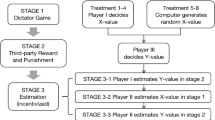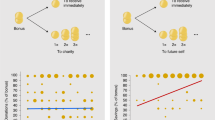Abstract
Fehr and Gächter reply - Fowler et al. raise an important question1. They correctly argue that the desire to reduce inequality may motivate cooperators who altruistically punish free riders in our experiments2. Also, the evolutionary history of humans suggests that egalitarianism shaped many human cultures3 and that egalitarian motives may, therefore, be a powerful force behind the punishment of free riders. In addition, recently developed proximate theories4, which formalize the notion of inequality aversion, also suggest that egalitarian desires may be important. Fowler et al. contrast their egalitarianism hypothesis with our view that negative emotions against free riders drive punishment.
This is a preview of subscription content, access via your institution
Access options
Subscribe to this journal
Receive 51 print issues and online access
$199.00 per year
only $3.90 per issue
Buy this article
- Purchase on Springer Link
- Instant access to full article PDF
Prices may be subject to local taxes which are calculated during checkout

Similar content being viewed by others
References
Fowler, J. H., Johnson, T. & Smirnov, O. Nature doi:10.1038/nature03256 (2004).
Fehr, E. & Gächter, S. Nature 415, 137–140 (2002).
Boehm, C. Curr. Anthropol. 34, 227–254 (1993).
Fehr, E. & Schmidt, K. M. Q. J. Econ. 114, 817–868 (1999).
Gintis, H. J. Theoret. Biol. 206, 169–179 (2000).
Bowles, S. & Gintis, H. Theoret. Pop. Biol. 65, 17–28 (2004).
Falk, A. & Fischbacher, U. Games Econ. Behav. (in the press).
Anderson, C. M. & Putterman, L. Games Econ. Behav. (in the press).
Offerman, T. Eur. Econ. Rev. 46, 1423–1437 (2002).
Blount, S. Org. Behav. Hum. Dec. Proc. 63, 131–144 (1995).
Falk, A., Fehr, E. & Fischbacher, U. Econ. Inq. 41, 20–26 (2003).
Author information
Authors and Affiliations
Corresponding author
Rights and permissions
About this article
Cite this article
Fehr, E., Gächter, S. Egalitarian motive and altruistic punishment (reply). Nature 433, E1–E2 (2005). https://doi.org/10.1038/nature03257
Published:
Issue Date:
DOI: https://doi.org/10.1038/nature03257
This article is cited by
Comments
By submitting a comment you agree to abide by our Terms and Community Guidelines. If you find something abusive or that does not comply with our terms or guidelines please flag it as inappropriate.



